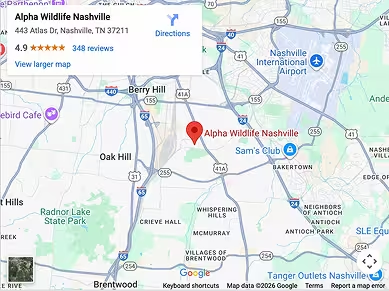Squirrel Removal Nashville TN | Raccoon & Skunk Wildlife Control
Alpha Wildlife Nashville
443 Atlas Dr, Nashville, TN 37211
📞 Phone: (615) 434-5331
✉️ Email: helpme@alphawildlife.com
Serving Locations
In Nashville
- Antioch
- Belle Meade
- Berry Hill
- Brentwood
- Clarksville
- Donelson
- Forest Hills
- Franklin
- Gallatin
- Goodlettsville
- Green Hills
- Hendersonville
- Hermitage
- Thompson Station
- Columbia
- Cookeville
- Lafayette
- La Vergne
- Lebanon
- Madison
- Mt. Juliet
- Murfreesboro
- Nolensville
- Oak Hill
- Old Hickory
- Smyrna
- Spring Hill
- Springfield
- White House.
- Portland Fairview Bellevue
Have you found squirrel droppings in your attic, raccoon damage to your roof, or freshly dug skunk holes in your yard? If so, you might be looking for the best wildlife removal company in Nashville to get rid of them. Well, you came to the right place!
Alpha Wildlife Nashville is a veteran-owned, wildlife control company that specializes in humane squirrel removal, raccoon pest control, and skunk trapping services. We also offer wildlife exclusion, prevention, and damage repair to prevent these pests from returning to your Middle Tennessee home.
Our team is proud to be BBB Accredited, NWCOA Certified, and have over 300 5-Star Google Reviews from verified customers. We are also dedicated members of the Nashville Area, Mt. Juliet, Rutherford County and Williamson County Chamber of Commerce.
No need to search for raccoon pest control, removal, skunk trapping, or squirrel removal near me. Call Alpha Wildlife today to schedule a free inspection.
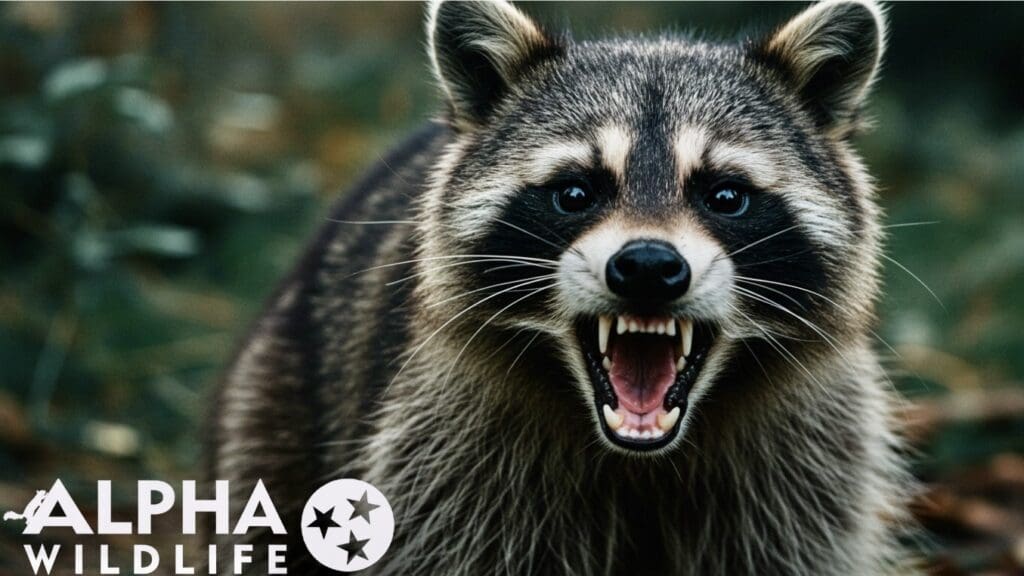
From Hendersonville to Murfreesboro to the Middle Tennessee State University, its common to see squirrels, skunks, and raccoons throughout the Nashville area. While these creatures are cute to look at, they can wreak havoc inside your home and to your property.
Not only can these critters cause damage, but they can transmit diseases to you and your family as well. Alpha Wildlife Nashville offers humane squirrel removal, raccoon trapping, and skunk control services that will safely remove these pests and permanently keep them away from your home.
If you live in the Gallatin, Brentwood, or Franklin area and are searching for Nashville wildlife removal services, look no further.
Call us today to schedule a free wildlife inspection!
Nashville Wildlife Control Problems
Whether it’s the music in Downtown Nashville, the historic homes in Franklin, or the beautiful scenery in Brentwood, wild animals are drawn to the Middle Tennessee area, and they aren’t planning to leave anytime soon.
Squirrels and raccoons are notorious for entering residences and making a home for themselves in the attic space.
These arrogant creatures will leave quite a mess for you to find as well.
While skunks might not get into your attic, they are known to hide under your deck or porch. Don’t worry, you’ll know they’re there because of the foul smell they leave behind.
Squirrels, skunks, and raccoons are the biggest troublemakers in the Middle Tennessee area when it comes to wildlife problems. Rest assured, with our emergency wildlife removal services, we have a solution for all of them!
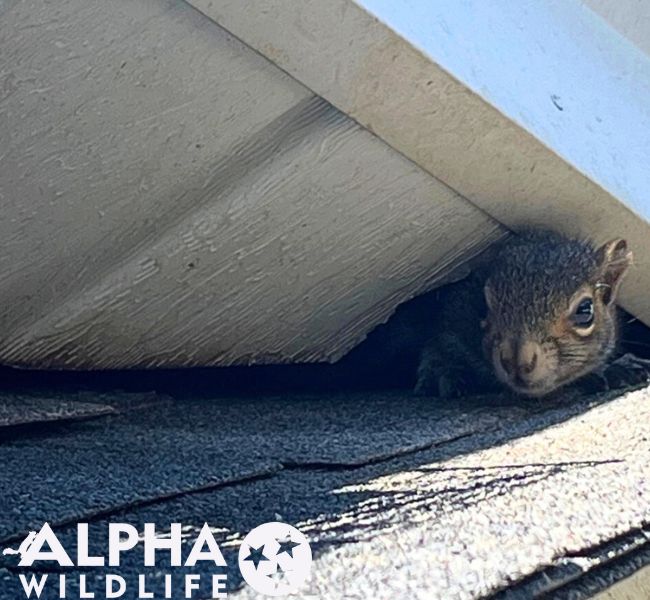
Types of Squirrels Found in Nashville Homes
The most common squirrel in this area is the Eastern Gray Squirrel, which has gray fur and a bushy tail. These animals thrive in the city’s parks, wooded areas, and residential neighborhoods.
While these critters look sweet and innocent, they are far from it. They are known to chew on electrical wires, insulation, and structural components inside your attic. They can also spread leptospirosis through their droppings, so keep that in mind.
When to call for Nashville Squirrel Removal?
Signs of a Squirrel Infestation
If you suspect a squirrel has made its way into your attic or around your property, watch for these warning signs:
Scratching Sounds
Squirrels are quick—but not quiet. If you’re hearing rustling or scurrying sounds, especially in the early morning or late afternoon, it’s likely squirrels are running through your attic or wall spaces.
Chewed Electrical Wires
Squirrels constantly gnaw to wear down their teeth, and unfortunately, that includes your wiring. Damaged wires are a serious fire risk and one of the most dangerous signs of an infestation.
Squirrel Droppings
Look for small black pellets near insulation or entry points. These droppings aren’t just messy—they can carry harmful diseases like salmonellosis and leptospirosis. Never try to clean them up yourself. We’ll do it for you!
Nesting Materials
If you find twigs, leaves, or shredded insulation, squirrels may be using your attic or chimney as a nesting site.
Catching these signs early can save you from expensive repairs and health risks. At Alpha Wildlife Nashville, we’ll remove the squirrels from your attic and get your home back to normal.
Our Nashville Squirrel Removal & Control Services
So, you’ve found squirrel droppings in your attic as well as chewed electrical wires in your home. What do you do now?
You could try to investigate the wildlife damage and risk getting exposed to a disease like leptospirosis or releasing the wild animal into your home with your family. Neither of those options sound good.
We make things very simple. Alpha Wildlife offers free inspections as well as quotes for our Squirrel Pest Control Services.
Below is our step-by-step process to get rid of the squirrels in your home for good!
Squirrel Inspection
Our experts check attics, soffits, and vents for signs of nesting and entry points. We also look for squirrel droppings and chewed materials in and around your home to determine the severity of the infestation.
Humane Squirrel Trapping & Removal
Professional squirrel trapping in Nashville is essential for homeowners dealing with squirrel infestations. Using safe, humane trapping methods, our experts capture them without harm, ensuring that no animals are injured during the process, and none are left behind.
Squirrel Exclusion, Prevention, & Damage Repair
This process is key to preventing future issues. Our technicians will fully seal gaps, holes, and other openings in your roof, attic, vents, and foundation. This proactive approach helps keep them out and prevents future infestations, offering long-term protection for your home.
If you believe there is a squirrel in your attic or home, call Alpha Wildlife for our Nashville Squirrel Removal Services. Call today for a free inspection!
Types of Skunks in Nashville TN
We’ve all been through this situation. You’re driving through a neighborhood in Hendersonville and the smell hits you like a ton of bricks.
The skunk spray smell is a distinct and, unfortunately, common odor in the Middle Tennessee area. This is due to skunks being a typical nuisance to the community.
The eastern spotted skunk and the striped skunk are known to burrow near foundation vents, HVAC units, porches, and even under your home.
If you notice any of the signs below, you don’t need to search for skunk removal or trapping near me, just call Alpha Wildlife!
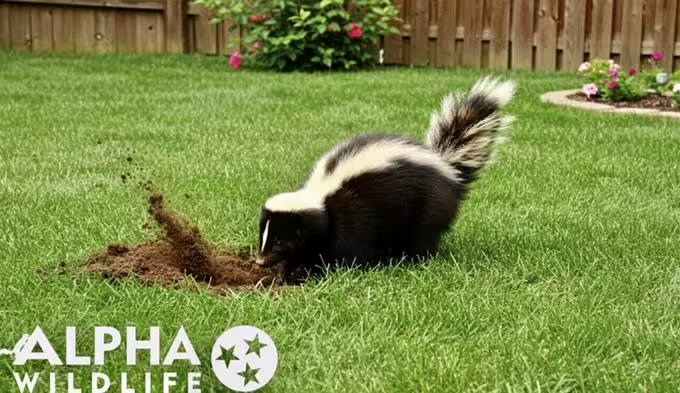

When to call for Skunk Removal — Signs of a Skunk Problem:
Strong Skunk Smell
You know it when you smell it. Skunk spray has a strong, lingering odor that can hang around for up to three weeks. If the smell is concentrated near crawlspaces, decks, or porches, there’s a good chance a skunk is nearby.
Tracks or Droppings
Look for small, blunt-ended droppings near den sites or trash areas. Skunk tracks have five toes with visible claw marks and usually show up near food sources or burrow entrances.
Burrow Holes in the Yard
Skunks dig shallow holes while searching for grubs or shelter. If you see fresh dirt and a small hole near your porch or foundation, a skunk may be settling in.
Nighttime Activity
Skunks are nocturnal, so listen for scratching or rustling sounds at night. You might wake up to knocked-over trash cans, dug-up lawns, or signs of movement around the base of your home.
Our Nashville Skunk Removal Process
The garbage cans are knocked over and there are holes in my yard, how can I get rid of this critter without getting sprayed?
Don’t overthink it. Call Alpha Wildlife for our Nashville skunk control services.
Below is our process to get these pests out without risking injury to you or your loved ones:
Home Inspection
Upon our arrival, our certified technicians will evaluate the outside of your home for burrows, tracks, and holes. We also check around the foundation of your home as well as surrounding structures, such as decks and HVAC units, for skunk burrows.
Humane Skunk Trapping & Removal
We do not recommend homeowners approach skunks due to their spraying abilities and sharp claws, so always call a professional for skunk removal situations. Our wildlife specialists will place humane devices near active burrows using bait that attracts skunks while minimizing the risk of capturing non-target animals. We handle all skunk trappings carefully to prevent spraying incidents.
Skunk Exclusion
Once the removal process is complete, we implement exclusion by installing barriers, sealing foundation gaps, and fixing broken vents around your home and property.
Types of Raccoons in Middle Tennessee
Raccoons are common in this area, and are often spotted in residential areas, parks, and even downtown spaces. These nocturnal creatures are known for their adaptability and are typically seen rummaging through garbage cans.
Raccoons are particularly drawn to areas with easy access to food and shelter, such as attics, garages, and storm drains. While they are generally not aggressive, raccoons can sometimes pose a nuisance by causing damage to homes or spreading diseases like rabies.
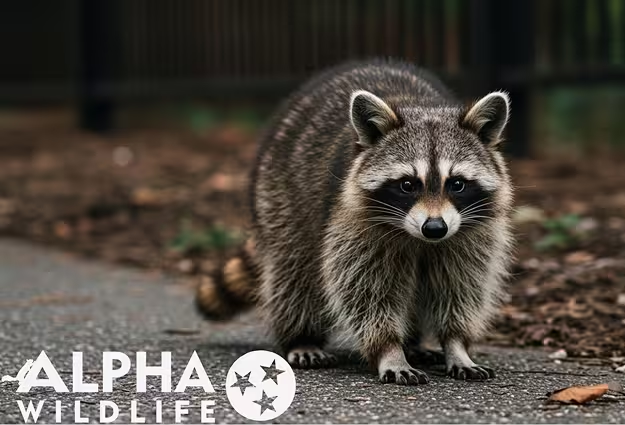
When to Call for Humane Raccoon Control – Signs of a Raccoon in Your Attic
Noises at Night
Raccoons are nocturnal, so if you’re hearing loud scurrying in the attic or around your trash cans after dark, it’s a strong sign one (or more) have moved in.
Raccoon Droppings
Raccoons often return to the same spot to relieve themselves. Large piles of droppings in your attic or crawlspace could indicate an active infestation. These droppings can carry dangerous parasites like Baylisascaris, so avoid cleaning them yourself.
Roof or Attic Damage
Look for chew marks, scratches, torn insulation, or damaged soffits and vents. Raccoons are strong and resourceful—they’ll tear through shingles or weak spots to find shelter.
Paw Prints & Trash Scattered
Raccoons leave muddy paw prints near entry points and in dusty attic areas. And if your garbage cans are constantly tipped over, they’re likely digging for leftovers.
Not only can raccoons spread disease, but they may become aggressive if cornered. Protect your home and family, call Alpha Wildlife for fast raccoon removal & trapping services. We’ll get them out for good!
Our Nashville Raccoon Removal & Trapping Services
Hearing strange noises at night? Noticing damage to your soffits and vents? Don’t let these critters destroy your beautiful Spring Hill home.
Alpha Wildlife offers effective raccoon trapping and removal services that will get them out and keep them out. Below is our process for our humane raccoon removal services in Nashville:
Raccoon Inspection
Our licensed technicians will evaluate your residence for signs of raccoon activity. They will also locate all open areas and gaps into your home.
Raccoon Trapping
Based on the inspection, we provide you with a customized raccoon trapping plan for your unique needs. Our technicians strategically place devices in areas where they are most likely to enter and utilize humane methods for capturing them.
Raccoon Exclusion & Prevention
After we safely remove the critters, we will seal entry and access points into your home to prevent a secondary infestation. We aim to provide a complete solution that secures your property while promoting a safe and raccoon-free environment.
Don’t let these critters drive you crazy, call Alpha Wildlife for our Nashville raccoon control services and reclaim your home!
Squirrel Exterminator vs. Humane Wildlife Removal?
If you find a squirrel destroying your attic or a raccoon digging through your garbage can, your first thought is probably to contact a local squirrel exterminator. Wildlife exterminators will kill the intrusive critter, but they can also be detrimental to you and your family.
Most wildlife exterminators use poisons to kill the animals. While this takes care of the problem now, it doesn’t provide a long-term solution to keep them away or prevent a secondary infestation. Also, if a dead animal gets stuck in your attic or crawlspace, now you’re dealing with a whole different set of problems.
With our Nashville Wildlife Removal Services, we use humane squirrel, skunk, & raccoon removal methods to safely capture the critters and remove them from your property. Then, with our exclusionary process, we seal up your home to prevent them from returning.
This now solves your problems, establishes a long-term solution, and safely removes the animal.
So, instead of searching for squirrel exterminator near me, contact the Best Wildlife Removal Company in Nashville that will get the job done right!

Why Choose Alpha Wildlife for Wildlife Removal in Nashville?
Whether you’re in East Nashville, Brentwood, Franklin, or Hendersonville, Alpha Wildlife Nashville is your go-to team for safe & humane squirrel, skunk, and raccoon pest control.
As a veteran-owned and locally operated company, we’re proud to protect Middle Tennessee homes with high-quality wildlife control services.
Here’s why so many Nashville homeowners turn to Alpha Wildlife:
Customer-First Approach
We know how stressful it is to deal with wildlife in your home or yard. From the moment you reach out, your safety and peace of mind become our top priority.
Our friendly wildlife experts will walk you through the process and make sure you feel confident every step of the way.
Certified & Experienced Technicians
Our team is fully licensed in Tennessee and NWCOA-certified to handle all types of wildlife. We stay up to date with state laws and humane practices to ensure your problem is resolved quickly.
Tailored Wildlife Control Plans
No two homes—or infestations—are the same. That’s why we take the time to inspect your property thoroughly before building a custom plan for removal, exclusion, and prevention.
Alpha Wildlife provides humane removal services for raccoons, squirrels, skunks, and other nuisance wildlife. We also specialize in commercial bird removal in Nashville, helping businesses protect their buildings from costly damage.
Whether you’ve got raccoons in your attic, skunks under your deck, or dealing with flying pests, we’ll create a solution that works for your specific situation.
Raccoon, Skunk, & Squirrel Removal Nashville – FAQs
What is the cost of removing squirrels in Nashville?
Squirrel removal costs vary depending on the type and extent of the infestation. Contact us for a personalized quote.
How do I know if I have a squirrel problem in my attic?
Signs include scratching noises, droppings, and visible damage to insulation or wiring. If you suspect an infestation, contact us for an inspection.
Is skunk removal safe for the animals?
Yes, we use humane methods to remove skunks, ensuring their safety and well-being during removal and relocation.
Can skunks in Tennessee carry rabies?
Yes. Skunks are one of the primary carriers of rabies in Tennessee, which makes professional removal essential for your family’s safety.
Can skunks on my property be dangerous?
Yes, skunks can pose health risks by spreading diseases such as rabies, leptospirosis, and intestinal roundworms, and they will spray, bite, and scratch when cornered. Their digging can cause significant property damage.
Are raccoons dangerous to Nashville homeowners?
Raccoons may look cute, but they can spread rabies, parasites, and cause significant property damage when cornered or nesting in attics.
What attracts raccoons to homes in Nashville?
Garbage cans, pet food, bird feeders, and easy attic access points are the main attractants.
Do raccoons return after being trapped?
If exclusion work is not done, raccoons often return or new ones move in. That’s why our raccoon removal service always includes sealing entry points.
How can I prevent wildlife from entering my home?
Sealing entry points, storing pet food securely, and maintaining a clean and clutter-free environment can help prevent wildlife problems and reduce the risk of animal damage to your home.
Who should I call for wildlife removal in Nashville TN?
Alpha Wildlife Nashville is veteran-owned, BBB Accredited, NWCOA Certified, and trusted with over 300+ 5-star reviews for humane wildlife control.
How long does wildlife removal take in Nashville?
Every case is different, but most infestations (squirrel, skunk, raccoon) are resolved in just a few days depending on severity.
What time of year is wildlife removal most common in Nashville?
Spring and fall are the busiest seasons when animals look for shelter in attics, crawlspaces, and under decks.
Is wildlife removal safe for pets and kids?
Yes. We use humane methods that protect your family, pets, and property.
What areas do you service in Nashville?
We proudly serve Nashville and the surrounding Middle Tennessee area, including the following cities: Antioch, Belle Meade, Berry Hill, Brentwood, Clarksville, Donelson, Forest Hills, Franklin, Gallatin, Goodlettsville, Green Hills, Hendersonville, Hermitage, La Vergne, Lebanon, Madison, Mt. Juliet, Murfreesboro, Nolensville, Oak Hill, Old Hickory, Smyrna, Spring Hill, Springfield, and White House.
Do you offer emergency wildlife removal in Nashville and the surrounding communities?
Yes, but it does depend on the availability of the technician at the time. If you have an emergency and need immediate residential wildlife removal, call us right away.
What’s the difference between a squirrel or raccoon exterminator and humane wildlife removal?
Exterminators typically use poisons or other harmful chemicals to kill the intruding critter This can lead to dead animals in the walls or the attic of your home. It also does not provide a long-term solution to prevent wildlife from returning. Alpha Wildlife offers humane trapping of the animals so they can be safely removed from your home. We then properly seal your residence to prevent a secondary infestation. Our process resolves your problem without killing the animal and provides you with long-term protection.


